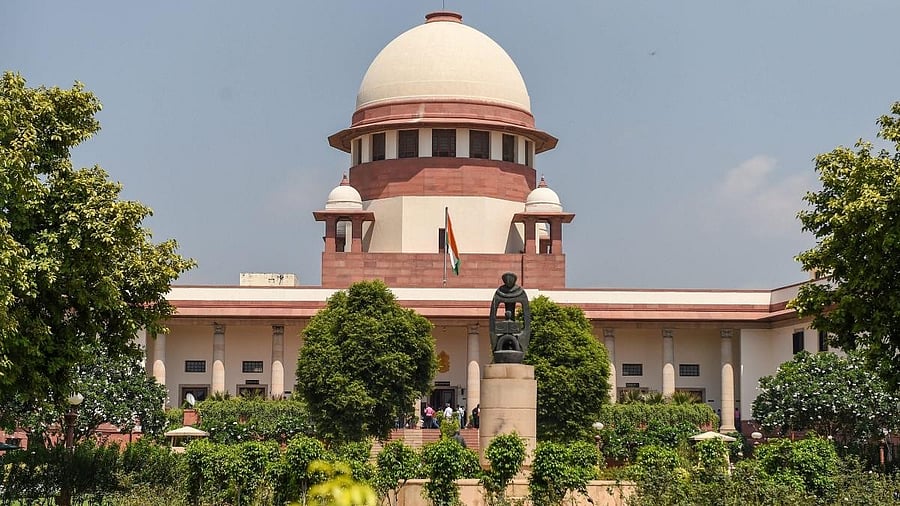
The Supreme Court of India.
Credit: PTI Photo
New Delhi: The Supreme Court on Tuesday declined to entertain a plea against an order of the Delhi High Court, which had refused to set aside the dismissal of a Christian officer of the Indian Army who had abstained from attending a puja held as part of the regimental parade.
A bench of Chief Justice of India Surya Kant Justice Joymalya Bagchi said that a violation of Article 25 (freedom of religion) of the Constitution should focus on the essential parts of a religion, not just any religious feeling.
The court also said that the officer should have respected the main beliefs of the majority of those he led.
Senior advocate Gopal Sankaranarayanan represented the petitioner, Samuel Kamalesan, submitted he was dismissed for a single infraction as he did not enter the sanctorum where his troops are offering worship.
"According to the regiments, there is what is known as Sarv Dharam Sthal, a hall in which symbols of various faiths are kept. He has entered those… this one place in Mamun in Punjab, where the regiment was posted, did not have the Sarv Dharam Sthal (place of all religions). They had a gurdwara and a temple, nothing else… there are photographs where he is standing right outside the sanctum sanctorum,” the counsel contended.
The petitioner's entering the sanctum sanctorum is a violation of his own faith, and none of his troops have a problem, but his superior had a problem with it, the counsel added.
The bench, however, referred to the communications sent by the petitioner, saying if there was no action required, he should have been thrown out only on this ground.
"This exhibits the grossest kind of indiscipline by an army official," the bench said.
The counsel contended that it is not that when one joined the army, he lost the vestiges of his faith guaranteed under Article 25 of the Constitution.
"He was counselled by the pastor, and the pastor said there is no breach of your faith, if you go inside the sanctum sanctorium. He has his own personal interpretation. If the pastor, the head of your faith, says that it does not affect the essential feature of your faith. Will the personal understanding of a believer be unique? Will the pastor’s view be overridden," the bench asked.
The counsel submitted that the conversation with the pastor was limited to Sarv Dharam Sthal, and it was not about the temple and gurudwara.
The bench, however, pointed out,it was a regimental Sarv Dharam Sthal.
"You are the troop leader, there are Sikh soldiers, and because of the Sikh soldiers, there is a gurdwara, which is one of the most secular places to visit. The tone and tenor in which he is acting, is he not insulting his own soldier? He has his own religious ego," the bench said.
"Unfortunately, these kinds of matters are also something we are required to discuss. For him, it was not a question of gurdwara, temple or church... he said even if a church is there in Sarv Dharam Sthal, he will still not go. Because there are other religious structures there. This is the attitude and approach of an army officer who is the group leader," the bench said.
The counsel contended that the petitioner had made it clear that his protestant, monotheistic faith does not permit him to worship other people in an active fashion.
"I think the Constitution permits that much. It does not mean that because you have taken on the uniform of the army..." the counsel said.
The counsel submitted, the question simply for the court's consideration was if the fundamental rights of individuals preserved under Article 25.
The court, however, said, "Breach of Article 25 needs to be seen from the angle of essential features of a religion and not every sentiment of a religion. Every sentiment of a religion, Article 33, will come into place. In this situation, when we match from Article 25 to Article 33, we have to definitely, as you rightly said, acknowledge and respect your essential features... you have to respect the collective faith of the majority of your command, which you are commanding."
The bench said the petitioner insulted his own troops, and leaders have to lead by example.
"Where in the Christian faith does entering the temple of another faith is barred," the bench asked the counsel, who cited the first command.
The bench said that the first commandment says you have faith in one God and pointed out that even in the Hindu religion, there is also faith in one God, and there is an overlap, and "the pastor had advised you to do it, but you have your own understanding."
The bench said, "When a pastor advises you that there is no violation, accept that. You cannot interpret what your religion forbids or allows based on your own understanding."
Lieutenant Samuel Kamalesan was commissioned into the Indian Army on March 11, 2017, in the rank of a lieutenant in the 3rd Cavalry Regiment, which comprises three squadrons of Sikh, Jat, and Rajput personnel. He was made the troop leader of Squadron B, which comprises Sikh personnel.
He approached the apex court against the Delhi High Court order, which held that commanding officers are to lead by example, placing unit cohesion above individual religious preferences.
